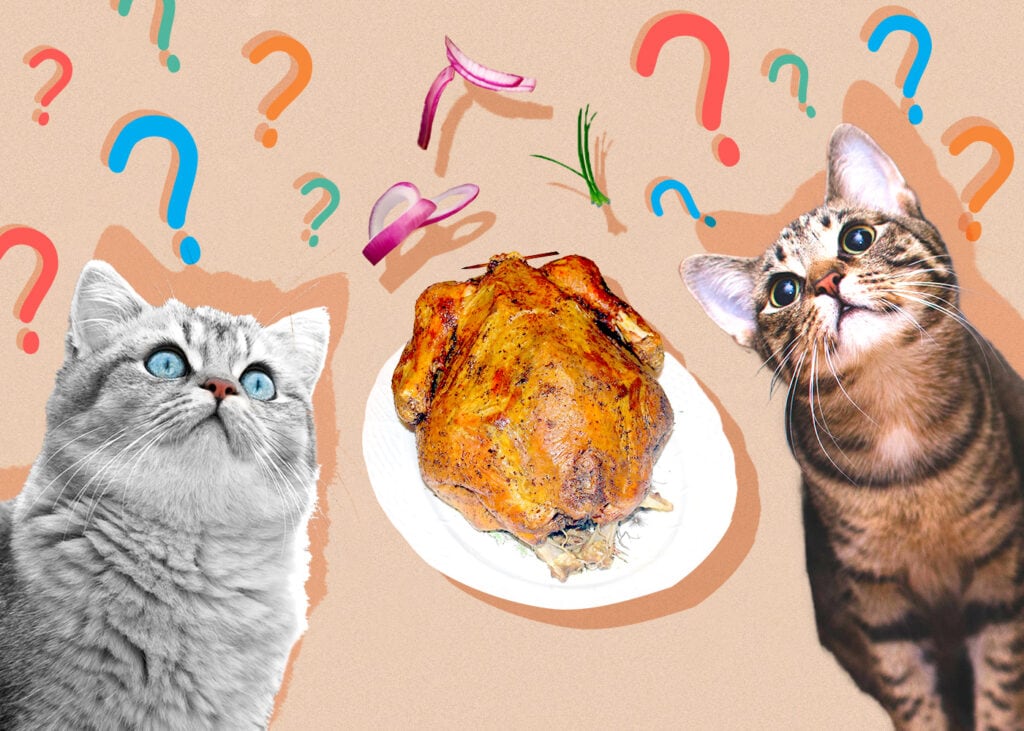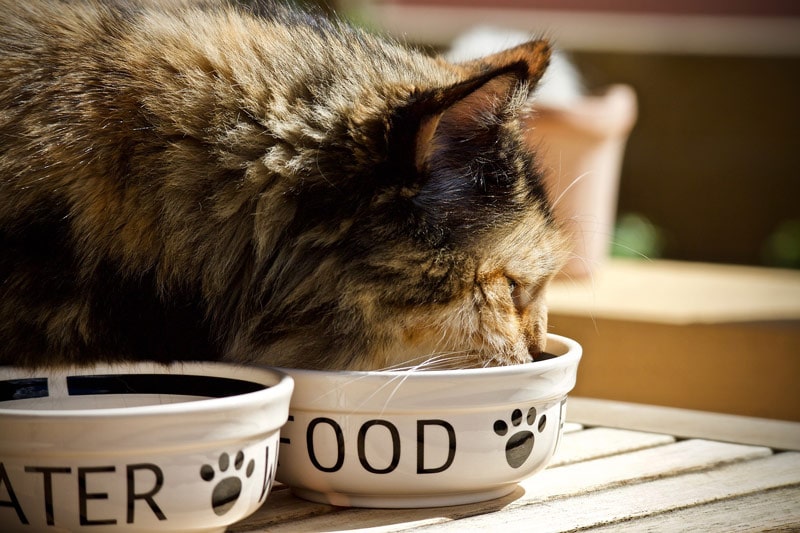Can Cats Eat Turkey? Vet-Reviewed Facts & Feeding Tips

Updated on

Whether you’re preparing a huge Thanksgiving feast or just want to enjoy a tasty turkey sandwich, your kitty may come running as soon as they get a sniff of that giant, juicy bird. But is it safe to treat your cat to some turkey? Yes, as long as it’s plain and fresh, your feline can feast on some turkey. In fact, turkey meat is a common ingredient in commercial cat food.
Here is everything to know about feeding your cat turkey, including possible health benefits, concerns, and how to properly prepare some tempting turkey tidbits.
Can Cats Eat Turkey?
Your house cat comes from a long line of carnivores. This means that your feline friend needs a diet high in animal protein and fats for optimal growth, health, development, repair, and reproduction.
Wild cats survive on a diet of prey that is high in protein and fats but low in carbs. This is why lean, fresh, and organic turkey makes a great treat for your cat.
When served in moderation, small pieces of turkey can be a great treat or addition to your cat’s diet. Turkey is an excellent source of protein for cats, which satisfies the bulk of your pet’s nutritional needs. Turkey also contains taurine. Taurine is an essential amino acid for cats. This means that their bodies cannot make it on their own and require it in their diet. Perhaps not surprisingly, taurine is found in high amounts in animal meat and organs; this further reinforces the idea of felines being obligate carnivores.
Turkey also has an interesting nutritional profile as far as proteins go. It’s one of the leaner meats and is significantly lower in fat when compared to options such as lamb, beef, and pork. Even with the skin on, most cuts of turkey often contain just about 5–8% fat, on average. When roasted, turkey cuts have either the same or less fat than all comparable chicken cuts 1.

Is Turkey Bad for Cats?
While turkey makes a great snack for house cats, you should avoid feeding it to your pet in a few ways, including:
- Raw: There are different opinions on this matter, but offering your pet raw meat of any kind prior to consulting your veterinarian is generally considered too risky. Feeding your cat raw meat can increase their chance of contracting bacteria, such as Salmonella. Not only can your cat contract harmful bacteria, but other members of the household can get food poisoning as well. Speak to your vet if you are planning on feeding your cat raw meat to understand the risks and precautions that need to be taken.
- Skin-Only: Unless directed by your veterinarian, you should not feed your cat turkey skin. This part of the bird is almost entirely fat and can upset your cat’s digestion; despite turkey being a relatively lean meat, the skin is nonetheless high in fat.
- Deep-Fried: While deep-fried turkey is a delicious occasional treat, it is not a healthy way to consume turkey meat. Deep-fried foods are exceptionally high in calories.
- Seasonings: Some types of seasonings, including powdered garlic or onion, are toxic to cats. Cats also lack the ability to taste sweet substances, so a sweet seasoning (even if non-toxic) isn’t going to add any nutritional value or increase the palatability of turkey for your cat.
- Deli Turkey: Deli meats can be harmful to your cat because they contain lots of preservatives.
- Bones: While it may seem tempting, never offer your cat a turkey bone. A bone can easily splinter, cause gastrointestinal problems, and become a foreign body hazard. Your pet can also choke on a bone.
- Ground Turkey: It’s best to avoid feeding your pet ground turkey in most instances, as it’s often lower in protein but higher in fat when compared to other cuts. However, in some instances, an animal nutritionist might recommend some ground turkey depending on your pet’s nutritional needs.
How to Feed Your Cat Turkey
If you decide to feed your cat turkey, it’s best to stick to plain, fresh, and season-free pieces of cooked and skinned turkey meat. As mentioned above, it’s best to avoid deep-fried and deli turkey, and it’s also best to not feed them bones or turkey skin. However, please do keep in mind that if you’re working with an animal nutritionist and/or your veterinarian to formulate a specific diet for your pet, then it might be appropriate to incorporate the skin into your pet’s diet.

Conclusion
While your cat can safely eat turkey, you shouldn’t go feeding them every type of turkey available on the market. As a general rule, it’s best to only feed your cat small pieces of clean, unseasoned, skinned, and lean turkey in moderation. It’s also strongly advised to avoid seasoned turkey, deli, or ground turkey, raw meat, or turkey skin or bones.
Your cat thrives on a complete and balanced diet specially formulated for them; however, don’t worry if next time you make a turkey sandwich you treat your kitty with a small piece of your favorite meat!
Learn more about what your cat can and can’t eat:











